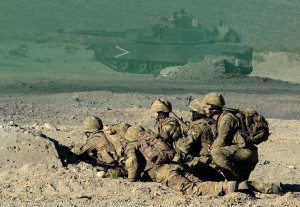Photo Credit: © Crown Copyright 2014 OGL
Transition – Your Final Challenge
This is your time
The process of transition is your final challenge in the military – the challenge of first accepting, then successfully adjusting, to a new life beyond the wire. It’s a challenge you need to train for with the same commitment as all your Army training.
This is precious ‘in-between’ time. A time when you can focus exclusively on what you want to achieve for yourself and your family. Be in no doubt that the respect, credibility and trust you hold as a member of our armed forces has never been higher. If you need proof, just look back at the way the British public applauded the troops who ‘saved’ the 2012 Olympics from G4S!
The Olympics are hard evidence that your core personal skills are in demand. Have confidence and look positively on the freedoms and opportunities that lie ahead. Believe it. Quality wins out. Remember, you’re not starting from scratch and you’ve got incredible years of experience in the Army. True, you may not have commercial experience, but think about it, anyone who’s ever started a new venture or a new business has little or no experience when they start. The qualities you possess in the Army of perseverance, dedication and commitment are the same needed to take the next step and make a success of it.
Never Self-Limit
These first paragraphs are not just words on a printed page. They’re true. Let’s move on. The second objective is to gain clarity as to what really motivates you, what are the interests that really gets your motor running. At this stage don’t self-limit – don’t say you couldn’t do something or achieve anything. If you only think about getting a job as quickly as you can to pay bills and gain some kind of security – you may never find that involvement that really makes you feel fulfilled. Importantly, you need to find an answer in civilian life that provides enough of a challenge and gives the satisfaction and sense of achievement to balance against your time in the Army. Obviously, nothing can replicate that experience. You need to find a career that satisfies a deep personal need, something that ‘completes’ you. This is what I mean:-
In the October 2012 issue of Soldier, in the ‘Soldier to Civvy’ piece, Sarah Goldthorpe and Becky Clark ran a series of interviews that included Sapper John Hogan who now edits ‘Superbike’ magazine, Adam Smith of the Light Dragoons who is now a brewer, Levison Wood 3rd Battalion the Paras, who is now involved with secretcompass.com, an adventure travel company. Lev’s advice is “Don’t do a job just for the cash – life is too short”. Each person has moved forward and found that there really is life after leaving.
Challenge Training – The Process
The training process starts with you – and finishes with you, your partner and family. Because once you’ve moving forward, the process must include those closest to you and how they will resettle as a mutually supportive unit into society. We’ll come back to this vital aspect in a moment. Now let’s look at what you should expect from all the excellent training programmes available.
Step 1 – Get Your Head Right
Be utterly selfish. Concentrate only on your skills, attributes and passions. Think deeply. When you’ve been on operations, either giving or receiving orders, you would not have had time to take a ‘time-out’ to connect with thoughts like these. It does not automatically follow that you’ll continue in the area that was your Army speciality. True, if you were in the ‘RE’ then employment options may be more obvious than if you were a ‘generalist’ in the infantry. But you’ll be looking forward to the coming years, not back over your shoulder.
Step 2 – Open Your Mind
Explore the options out there. Get up to speed with opportunities in the Public, Private and Voluntary (Charity) Sectors. Do you like the idea of starting your own business? Or perhaps going into a particular line of work with the end result being that after gaining experience you would like to start a business. Remember you don’t have to do it all on your own. If you have particular creative talents you can match up with someone who is fantastic with figures. Often blending talents makes a successful combination.
Step 3 – Gain Clarity, Set Targets, Define Personal Goals
The aim of this personally intense process is to gain clarity of purpose and direction. It could be that there’s still work to do, to drill down deeper before things start to click. Everyone’s different. Some opt for the job route and live happily ever after. Others embrace a range of income activities and manage them all together, a portfolio career approach. At this point, if further personal coaching is required to develop skills, or start that business, or if you need help creating a portfolio lifestyle then suitable additional training is available to take you where you want to go. Make the most of what’s on offer.
Family First
I know from personal experience that family/partner support works both ways. Involve your partner as your resettlement training continues as their understanding and approval is vital. By the same token, when you’ve been away on operations, it is your partner that has held things together at home. This is their time too; an opportunity to reshape their lives and perhaps take a job or explore avenues that together will create a strong base for the future. The Army Families Federation – www.aff.org.uk, provides excellent advice. Their website is well worth a visit.
Last Word
Resettlement training is like a decompression chamber for the mind; that allows you to mentally take off your uniform and step into your ‘civvies’. The future is out there waiting for you. It needs your talent. Embrace the change. Civilian life will be the richer for having you in it.

